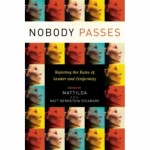Yesterday in my Queering Theory course, we discussed making trouble. Making trouble comes in a lot of forms. In fact, there are so many different ways to think about making trouble that you could teach a whole class (and more than once) on the topic and barely scratch the surface (oh wait–that’s what I’m doing!). But seriously, the abundance of themes/topics/readings that fit in this category is making it difficult (troubling?) for me to narrow down my reading list for my troublemaking class next semester. But I am not complaining; trying to choose between too many ideas and really interesting books is a nice problem to have.
 Anyway, back to the point of this entry. For our discussion in Queering Theory yesterday, I chose Mattilda’s Nobody Passes. While this book offers one notion of troublemaking in terms of anti-assimilation and rejection, it does so in a wide range of ways by broadly interrogating the idea of passing and not passing in terms of “the ‘right’ gender, race, class, sexuality, age, ability, body type, health status, ethnicity–or as a member of the coolest religion, political party, social/educational institution, exercise trend, fashion cult, or sexual practice” (9). Some may argue that this broad approach is too broad, as Mattilda’s editor Brooke does when she tells Mattilda that “she’s worried that I’m [Mattilda] compromising the integrity of the book by ‘reaching too far beyond the parameters we’ve tried to establish'” (13). But Mattilda sees her broad reach as central to the book’s purpose. She writes:
Anyway, back to the point of this entry. For our discussion in Queering Theory yesterday, I chose Mattilda’s Nobody Passes. While this book offers one notion of troublemaking in terms of anti-assimilation and rejection, it does so in a wide range of ways by broadly interrogating the idea of passing and not passing in terms of “the ‘right’ gender, race, class, sexuality, age, ability, body type, health status, ethnicity–or as a member of the coolest religion, political party, social/educational institution, exercise trend, fashion cult, or sexual practice” (9). Some may argue that this broad approach is too broad, as Mattilda’s editor Brooke does when she tells Mattilda that “she’s worried that I’m [Mattilda] compromising the integrity of the book by ‘reaching too far beyond the parameters we’ve tried to establish'” (13). But Mattilda sees her broad reach as central to the book’s purpose. She writes:
the point of this book is to make people reach too far, to roll into critical, complicated, dissonant essays that grumble with uncomfortable revelation (13).
I like this idea of reaching too far. I especially like the inclusion of “too.” Reaching too far isn’t just a matter of stretching ourselves to think beyond what we know (to reach far). Reaching too far is about going past our limits in ways that may make trouble for us, but can also create connections and new possibilities for understanding and living in the world.
 As I reflect on it more, the idea of reaching too far seems different than merely rejecting oppressive institutions or norms or ideologies. Instead of rejection, Mattilda seems to be engaged in transgression (as in crossing over and beyond). The idea of reaching too far as transgression reminds me of Foucault’s discussion of the limit-attitude in “What is Enlightenment?” Here is what he writes about it:
As I reflect on it more, the idea of reaching too far seems different than merely rejecting oppressive institutions or norms or ideologies. Instead of rejection, Mattilda seems to be engaged in transgression (as in crossing over and beyond). The idea of reaching too far as transgression reminds me of Foucault’s discussion of the limit-attitude in “What is Enlightenment?” Here is what he writes about it:
This philosophical ethos may be characterized as a limit-attitude. We are not talking about a gesture of rejection. We have to move beyond the outside-inside alternative; we have to be at the frontiers. Criticism indeed consists of analyzing and reflecting upon limits….The point, in brief, is to transform the critique conducted in the form of necessary limitation into a practical critique that takes the form of a possible crossing-over (315).
[the limit-attitude must be understood as one in which the] critique of what we are is at one and the same time the historical analysis of the limits imposed on us and and an experiment with the possibility of going beyond them (319).
I need to think through how to read Mattilda’s project in relation to Foucault’s limit attitude. How might thinking about nobody passes as a transgression instead of rejection shape our reading of Mattilda’s introduction (and the collection as a whole) differently? What are the differences between transgression and rejection?
 Note: As I was thinking about transgression and rejection, I came across a book by Ashley Tauchert, Against Transgression. I plan to check it out from the library today. In reading through the description, I was particularly intrigued by these three purposes of the book: 1. studies the origins of the contemporary proliferation of ‘Transgression’ in the compelling thought experiments of Georges Bataille, and follows its inauguration as a mode of legitimate critical practice via Michel Foucault; 2. tracks the author’s rejection of Transgression as a legitimate critical methodology following her mother’s death and her own maternal transfiguration; and 3. considers the place of grief in the transformation of thought.
Note: As I was thinking about transgression and rejection, I came across a book by Ashley Tauchert, Against Transgression. I plan to check it out from the library today. In reading through the description, I was particularly intrigued by these three purposes of the book: 1. studies the origins of the contemporary proliferation of ‘Transgression’ in the compelling thought experiments of Georges Bataille, and follows its inauguration as a mode of legitimate critical practice via Michel Foucault; 2. tracks the author’s rejection of Transgression as a legitimate critical methodology following her mother’s death and her own maternal transfiguration; and 3. considers the place of grief in the transformation of thought.

Comments are closed.